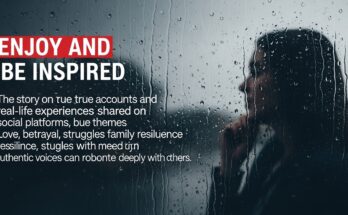Growing up, I was the invisible child. My sister was the golden girl—showered with praise, gifts, and affection—while I was met with indifference. Birthdays passed without celebration, achievements without acknowledgment. I learned early that love in our house was conditional, and I didn’t meet the criteria. My parents’ favoritism wasn’t subtle; it was a daily reminder that I didn’t matter. I buried the hurt and tried to be grateful for scraps of attention, but the silence around me grew louder with each passing year.
My sister basked in their admiration. She got the best clothes, the biggest room, and endless encouragement. I, on the other hand, was expected to be quiet, obedient, and grateful. When I excelled in school, they barely noticed. When I won awards, they shrugged. I started questioning my worth, wondering what flaw made me so unlovable. The contrast between us wasn’t just painful—it was humiliating. I felt like a ghost in my own home, watching life happen from the sidelines.
College was my escape. I worked hard, earned scholarships, and built a life far from their shadow. I rarely called home, and they rarely noticed. Meanwhile, my sister struggled—poor grades, bad relationships, and constant drama. Suddenly, they turned to me for help. Their golden child had tarnished, and now they needed the daughter they’d ignored. I felt a mix of vindication and resentment. After years of neglect, they wanted my support, my stability, my success. But I wasn’t sure I owed them anything.
When I visited home, the shift was palpable. They praised me, asked for advice, even apologized—half-heartedly. My sister resented the attention I now received, accusing me of stealing her spotlight. The irony wasn’t lost on me. I had spent years craving their love, and now that I had it, it felt hollow. Their approval came not from genuine affection but from desperation. I realized I had outgrown their validation. I didn’t need their praise—I had built my own worth.
Eventually, I confronted them. I told them how their favoritism had scarred me, how I had spent years feeling invisible. They cried, denied, deflected—but I stood firm. I wasn’t seeking revenge, just honesty. My sister listened in silence, perhaps realizing the damage done. That conversation didn’t fix everything, but it freed me. I had spoken my truth, and that truth mattered. I was no longer the forgotten daughter—I was the woman who found her voice.
Now, I live with peace. I’ve created a life filled with love, respect, and authenticity. My parents try to reconnect, and I allow it—on my terms. My sister and I are distant but civil. The past still echoes, but it no longer defines me. I’ve learned that being overlooked doesn’t mean being unworthy. Sometimes, the quiet child becomes the strongest adult. And sometimes, the ones who were ignored become the ones who rise.


